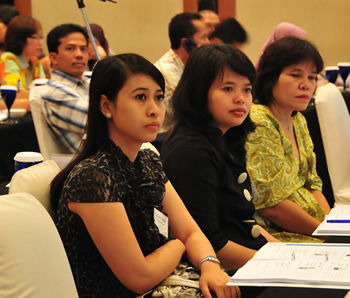TREAT Asia Launches Innovative Research Education Initiative
Tailor-Made Trainings Address Diversity of Regional Needs
February 2010—The expansion of HIV/AIDS treatment throughout Asia and the Pacific has brought hope to millions in the region who are living with the virus, but it has also created a host of complex challenges for HIV clinicians and researchers as they work to stay abreast of the latest developments in the field. Like the AIDS epidemic itself, resources and expertise vary widely from one country to the next, and the training needs of one clinical site may be very different from those of another. To address this diversity while boosting the overall quality of care in the region, TREAT Asia has created an innovative new education program that provides training specifically tailored to each setting.
"This is not a one-size-fits-all program," said TREAT Asia program coordinator Oratai Butterworth. "It was designed to respond to the training needs of the individual sites, based on what they told us they needed in order to build their research capacity." Launched in late 2008 with support from the Australian government agency AusAID, the program began providing support and training in 2009 in Cambodia, China, Indonesia, the Philippines, and Viet Nam, with plans to add Papua New Guinea this year.

HIV/AIDS specialists from across Indonesia came to Jakarta
for training in ethics and good clinical research practice. |
Researchers in Indonesia asked for training in good clinical research practice, and wanted specific information about how these standards would fit with their country's research ethics regulations. At a training in October in Jakarta, more than 50 physicians, researchers, clinical coordinators, and data managers learned how to apply international clinical research standards to the development of study proposals, and heard a presentation on research ethics and national regulations by the secretary of the ethics committee of the University of Indonesia.
"Stigma and discrimination, a lack of antiretroviral medications and treatments for opportunistic infections, and advanced disease progression make it difficult for us to conduct research among these patients," explained TREAT Asia Network member Dr. Tuti Parwati Merati, a principal investigator at Udayana University's Sanglah Hospital in Bali. "This training workshop has helped me and my colleagues learn more about the disease, the ethics of conducting research, and how to communicate best with our patients."
In Viet Nam, pediatric HIV/AIDS specialists and administrators wanted to learn how to develop research proposals to address questions affecting children with HIV in their country. In response, TREAT Asia developed a two-part training in clinical epidemiology. At the first session, held in Ho Chi Minh City in November 2009, 16 participants identified research questions they wanted to use as the basis for research protocols, which were developed through peer review discussions in February.
Principal investigators and junior researchers in China are hoping to disseminate their research results to the broader HIV community by publishing in English-language medical journals. To help them improve their proficiency in English scientific writing, TREAT Asia organized two workshops, the first of which was held in January 2010 and was attended by 24 participants from 13 clinical and hospital settings across China. "We were extremely pleased with the enthusiasm and motivation of the participants, who exceeded workshop goals by going beyond writing scientific abstracts and beginning to prepare manuscripts," said TREAT Asia's director of research, Liesl Messerschmidt.
TREAT Asia's new education and training program is also supporting longer-term projects, including laboratory capacity development in Phnom Penh, Cambodia, at the National Center for HIV/AIDS, Dermatology, and STDs, and technical support in biostatistics in the Philippines for the Research Institute of Tropical Medicine in Manila.